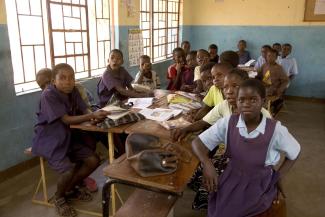Our view
Why we need the SDGs

A family’s income must allow all members a life in dignity. Moreover, all adult persons should be empowered to take their lives into their own hands. Poverty reduction thus means to provide everyone with opportunities, and particularly those who so far lack them.
Social inclusion depends on broad majorities seeing prospects of advancement. Where that is not the case, inequality will breed frustration. How to achieve opportunities for everyone is a much debated issue. According to market orthodoxy, government interventions in economic interaction only cause harm. Nonetheless, historical experience shows that long term development has always led to markets being stabilised by – and supplemented with – government-managed social protection. Related programmes ensure a minimum level of sustenance and, to some degree, even guarantee people’s social status. Prudent regulation lets markets flourish and also gives scope to environmental protection. In any case, all advanced nations have some kind of welfare state. Typically, the pillars include:
- universal access to health care,
- tuition-free schools,
- pensions and unemployment benefits, which tend to be linked to formal employment, plus
- some kind of basic welfare for everyone.
It is true of course, that the welfare state is comparatively weak in the USA, but that does not prove my argument wrong. Indeed, opportunities are far from equal in the USA, where life expectancy is lower than in EU member countries. On average, moreover, rich Americans live longer than their poor compatriots. Child mortality too is higher in the USA than in other prosperous nations. The reason is that many families from marginalised communities lack health insurance and thus do not have access to health care.
Social inclusion and eradicating poverty are high on the UN’s 2030 Agenda, which spells out the Sustainable Development Goals (SDGs). Progress is being made in many countries’ health and education sectors, and cash transfers are reducing need. Nonetheless, absolute and relative poverty still cause concern, and inequality is increasing almost everywhere. That is true of poor and rich nations alike. One reason is that market-fundamentalist ideology has largely discredited social protection. All too often, only market-generated results are deemed acceptable. Margaret Thatcher in Britain and Ronald Reagan in the USA started the trend of cutting social benefits and deregulating markets in the 1980s. Their examples were copied elsewhere, so social disparities have become more pronounced throughout the advanced economies.
In theory, markets solve every problem. In real life, that is not so. Otherwise, we would not need the SDGs. The informal sector is unregulated, only ruled by supply and demand. This sector keeps masses of people stuck in poverty. The truth is that markets only provide opportunities according to purchasing power. If everyone is to get a fair chance in life, governments must regulate economies competently. The World Bank’s most recent World Development Report offers valuable advice (see article on the matter) on the issue. Implementing its proposals will help to achieve the SDGs.
Hans Dembowski is editor in chief of D+C Development and Cooperation / E+Z Entwicklung und Zusammenarbeit.
euz.editor@fazit-communication.de












